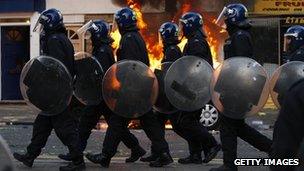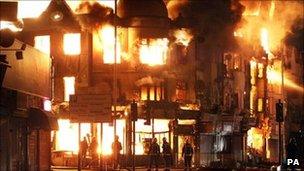England riots: Police operation 'flawed' say MPs
- Published
- comments

Some 299 officers were injured during the five nights of violence in England
The policing operation to tackle the summer riots across England was flawed, a report from MPs has concluded.
The perception that in some areas police had lost control of the streets was the most important reason disorder spread, they said.
The Home Affairs Committee said insufficient numbers of officers were initially deployed and police training for public disorder was inadequate.
The Metropolitan Police said it had outlined what it was doing to improve.
The Policing Large Scale Disorder: Lessons from the disturbances of August 2011, external report said flooding the streets with police was what ultimately quelled the disorder.
"If numbers could have been increased more rapidly, it is possible that some of the disturbances could have been avoided," it said.
"We regret this did not happen and, with the benefit of hindsight, we regard the operation to police the disorder in many towns and cities, and particularly in London as flawed."
It said the mutual aid system, under which police officers are transferred to forces in need, could have operated more quickly; it may have left areas which had loaned officers to other forces "vulnerable".
Copycat behaviour
Keith Vaz MP: "There was an absence of effective police tactics in some areas"
The report said anecdotal evidence from some of those convicted suggested the widespread disorder started when people saw police had "lost control" in Tottenham via television and social media. This echoes the findings of the independent Riots Communities and Victims Panel., external
"Clearly a feeling existed that desirable consumer goods could be made available by looting. There was a substantial element of opportunistic criminality and copycat behaviour," the report said.
"The absence of a police presence or sight of police officers apparently standing by and allowing criminal behaviour to take place was distressing for those whose homes and businesses were being attacked," it added.
Committee chairman Keith Vaz MP said: "Individual police officers acted with great bravery, and we commend them for their actions. However, in London and other areas, in contrast with the effectiveness of police responses in some towns and cities, there was a failure of police tactics.
"This situation might have been avoided had police appreciated the magnitude of the task.
"We urgently require a rapid improvement in police training to deal with public disorder. We urge the police to act more quickly in future and to review the arrangements for loaning officers from one force to another in this type of scenario."
He said that, for those who lost their homes and businesses, "the state effectively ceased to exist - sometimes for hours at a time".

The riots spread from London to other English cities, including Birmingham and Manchester
Mr Vaz told BBC Radio 4's Today programme the committee felt that there should have been better communication between the police and the local business community to ensure that people knew what was happening and how best to protect their livelihoods.
"Those areas where the chief constables had decided to take pre-emptive action and get police officers on the streets quickly were able to contain this violence much more effectively," he added.
The MPs say had more officers been deployed different tactics could have been used. The Met Police is training more police to use baton rounds and is considering buying three water cannon.
Mr Vaz said the committee did not feel water cannon would have helped police in the riots and may have caused "even greater disorders".
Communication failures
Riots broke out in Tottenham, north London, on 6 August, two days after the fatal shooting by police of 29-year-old Mark Duggan. Unrest spread across London and to other cities, including Manchester, Birmingham and Bristol over the following days.
But the committee's report said the specific causes behind the riots were still unknown.
The report criticised the Met Police and the Independent Police Complaints Commission over failures in communication with Mr Duggan's family, which it said made a potentially tense situation worse.
The committee also concluded it would be unhelpful to switch off social media during times of disorder, following claims rioters used it to organise themselves.
"People who made an active decision to join in the disorder could equally well have heard about it on the television as on social media," the report said.
The MPs say the government needs to urgently clarify whether the police authorities will be able to recover the £89.827m it cost to police the riots. It says the riots were an exceptional series of events at a time the authorities were being asked to make savings.
They also call on the government to speed up the process of reimbursing people under the Riot Damages Act.
Exceptional criminality
The Met Police said it had already recognised and publicised some of its findings on the issues identified and what it was doing to improve.
A spokesman said: "This includes acknowledging that we didn't have enough officers available quickly enough to respond to the initial disorder or its subsequent unprecedented escalation. As a result we have changed our mobilisation plans."
He added that the force was reviewing how it engaged with local communities and was working with Acpo and the IPCC to ensure communication was more effective in future investigations.
The Association of Chief Police Officers said the report had identified issues it believed was critical to get right within current policing reforms.
"This includes the capacity and ability to move sufficient numbers of police officers around the country when required to protect the public from national threats," a spokesman said.
"We will continue to look at all the various reports into the disorder to examine how the police service can best respond in future to the kind of exceptional criminality seen in August."